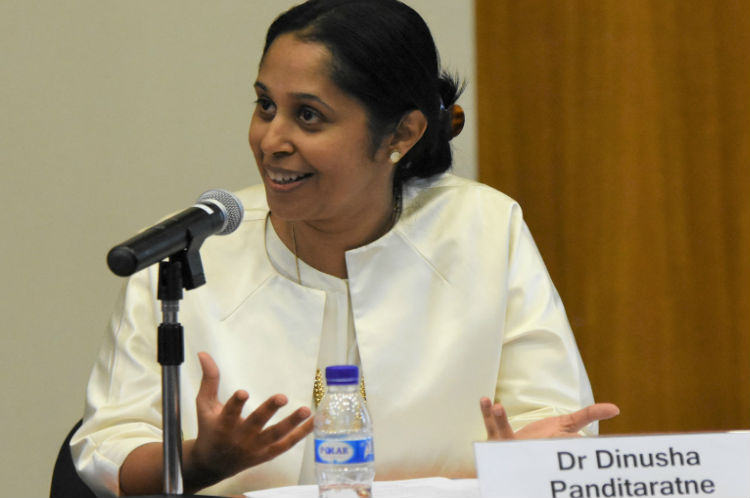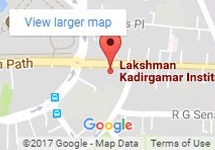
Reading Time: 3 min read
On 21 August 2017, Dr. Dinusha Panditaratne, LKI’s Executive Director, made an invited address at the National University of Singapore (NUS) on “Re-Energising the SAARC Process”.
The seminar was held at the Institute of South Asian Studies (ISAS) at NUS, in partnership with the Consortium of South Asian Think Tanks (COSATT), and the Konrad Adenauer Stiftung (KAS) Regional Political Dialogue in Asia.
More than a dozen heads and representatives from prominent think-tanks in South Asia, along with experts from Singapore addressed the seminar. Their presentations will be released in a forthcoming publication.
Dr. Panditaratne spoke at the opening panel on the “Current Deadlock in SAARC: Initiatives, Hurdles, and Possibilities” chaired by Dr. Iftekhar A. Chowdhury, former Foreign Minister of Bangladesh and Principal Research Fellow at ISAS. Other speakers on this panel included: Mr. Ramesh Nath Pandey, former Foreign Minister of Nepal; Major General (Retd.) Dipankar Banerjee of the Forum for Strategic Initiative in New Delhi; Major General (Retd.) A. N. M. Muniruzzaman, President and CEO of the Bangladesh Institute of Peace and Security Studies; and Mr. Md Touhid Hossain, former Foreign Secretary of Bangladesh.
Dr. Panditaratne spoke on the “Strategic Environment in South Asia from a Sri Lankan Perspective”. Her presentation highlighted shifts in thinking on Sri Lanka’s role in the region, and the following points :
- Sri Lanka no longer sees itself only as a small SAARC country, at the tail end of South Asia. Rather, it aims to reposition itself as a financial and maritime centre of the Indian Ocean.
- The new vision aims to take advantage of Sri Lanka’s strategic location between Dubai and Singapore, and of the significant increase in maritime traffic in the Indian Ocean.
- Correspondingly, this vision aims to transcend the political stagnation and economic limits of SAARC. Intra-regional trade in South Asia is a meagre USD 26 billion, compared to USD 447 billion among ASEAN countries.
- Within SAARC, however, Sri Lanka sees particular opportunity in bilateral trade agreements with other SAARC countries and in greater integration with India’s southern states – particularly Karnataka, Andhra Pradesh, Tamil Nadu, Kerala and Telangana, which have a total population of 250 million and combined GDP of USD 400 billion.
- Hence Sri Lanka aims to forge a dual identity, as the centre of the Indian Ocean and an economic entry point to the Indian subcontinent. There are significant challenges to achieving this dual identity, however, including:
- Balancing the expectations and investments of India and China – leaning towards one or another weakens Sri Lanka’s claims of being a “centre” of the Indian Ocean;
- Public antipathy towards stronger links with India hinders Sri Lanka’s development as an economic “gateway” to the Indian subcontinent;
- Corruption, poor inter-agency coordination and other factors contribute to the relative difficulty of doing business in Sri Lanka;
- Sri Lanka lacks sufficient skilled human resources to develop as a 21st century hub; and
- There is a potential resurgence of violent extremism, and continued non-traditional security threats like IUU fishing and climate change.
- Sri Lanka could address some of these challenges via cooperation with other SAARC countries. For example, many SAARC countries share valuable oceanic resources and face cataclysmic events related to climate change; factors which could incentivise cooperation on a regional Blue Economy and other modes of sustainable development.
- Given their extensive diasporas, SAARC countries could also share knowledge of ways to leverage diasporic talent to help meet shortages of skilled human resources.
- Ultimately, however, becoming a centre of the Indian Ocean and a gateway to the subcontinent will require far more than bilateral, sub-regional and regional cooperation in SAARC. It will require continued public pressure on the national government to fulfil its promises of 2015; to drive out corruption, build a sustainable peace, and show strong, normative leadership both within and outside the country.



